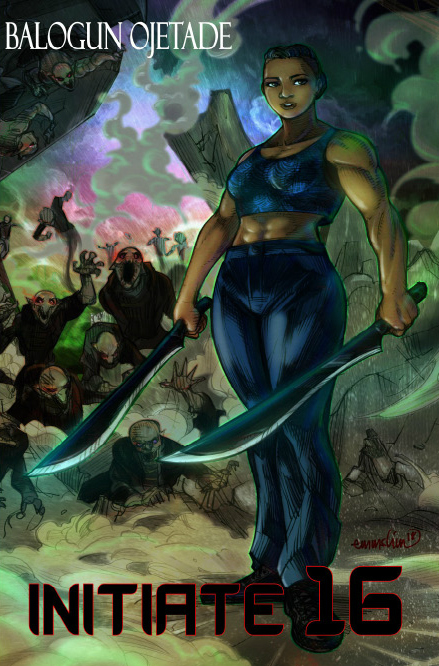It all started with Steamfunk – a style of writing and visual aesthetic that combines the culture and approach to life of people of African descent with that of the Steampunk aesthetic.
Next came Dieselfunk – fiction, film and fashion that combine the style and mood of Dieselpunk – Steampunk’s grittier sibling – with African and African-American inspiration. It is a name I came up with in 2012, playing off of Steamfunk.
Dieselfunk tells the exciting untold stories of people of African descent during the Jazz Age.
Think the Harlem Renaissance meets Science Fiction; think Chalky White (from Boardwalk Empire) doing battle with robots run amok in his territory; think Mob bosses, Nazis, the Tuskegee Airmen, the Tulsa Race Riots and jazz… that is Dieselfunk.
Then came Rococoa – the Age of Spring Technology and Clockwork.
Think Science Fiction and Fantasy meet Three Finger’d Jack, the pirate, Black Caesar and the Haitian Revolution. Think an afroretroistic Black Count, Nat Turner, and Stono Rebellion… that is Rococoa.
Now comes Biofunk.
Biofunk was born from Biopunk (a portmanteau of “biotechnology” or “biology” and “punk”) – a subgenre of science fiction that focuses on biotechnology. It is derived from cyberpunk, but focuses on the implications of biotechnology rather than information technology.
Biopunk is concerned with synthetic biology, bio-hackers, biotech mega-corporations, and oppressive government agencies that manipulate human DNA. Most often keeping with the dark atmosphere of cyberpunk, biopunk generally examines the dark side of genetic engineering and represents the low side of biotechnology.
What is Biofunk?
Biofunk, like Biopunk is a subgenre of science fiction, but it is closely related to Cyberfunk and its subgenre, Cybertrap, which focus on the speculative chronologically futuristic narratives that exist within the intersections of Black spaces and, in the case of Cybertrap, the aesthetics of classic trap music/culture, mixed with the tropes and world building of Cyberfunk.
Biofunk explores the triumphs and struggles of individuals or groups of African descent, long the products – or victims – of human experimentation and body modification.
Individuals are usually modified and enhanced by genetic manipulation and, central to Biofunk stories, is the belief that the next revolution will be in the field of biology; that the proper study of mankind is life; that physics and chemistry are only tools to probe living matter; and that computers are merely simulators and modelers for life.
The latest (first?) novel in the Biofunk subgenre is Initiate 16. Here is a description:
“Initiate 16 lay paralyzed, face-down on a glass table. Scores of blood-stained, shiny metallic needles, attached to snake-like arms, jutted from her back, neck, arms, legs, and even the backs of her heels. Her whole back was peeled open, revealing her spine. The bright lights in the ceiling above her shone on the slick, pink sinew of her back and upon several links of bone that composed her spine. Upon each link was carved an ancient rune – ‘the Odu’, her teacher had called them.
She didn’t know what an Odu was but she knew it gave her power… and pain.
The nerve-blocking chemicals coursing through her blood, bones and sinew numbed the pain, but she didn’t like them inside her body. She didn’t particularly enjoy initiation either, but it was a step closer to godhood – and only a god would dare tread where she would soon have to.”
Afrofuturism meets “Into the Badlands” meets “28 Days Later” in this post-apocalyptic, Biofunk thriller.
Ikoko, a physically weak, abused and psychologically disturbed young woman is selected against her will to become the first physically-enhanced hunter of “mutes” – people infected with the horrific Midway Mutagen. If the procedures go well, Ikoko will be transformed into the first of many Ologun – human killing machines – through genetic engineering, but such a powerful creature must be controlled and she will be… via an invasive memory-implantation program.
But the plan goes awry when the products of a top-secret project gone wrong, break out of the facility where they are being held and flee into the nearby city of Atlagos.
In the ensuing panic, the scientist in charge of implanting Ikoko’s memories inserts a program of her own making and turns Ikoko into a modern-day African warrior – part Shaka Zulu, part Mino (“Dahomey Amazon”).
Ikoko must face monsters – of meat, metal and combinations of both – to save herself, those she’s tasked with protecting, and maybe even a world gone absolutely mad.
Pick up your copy of Initiate 16 NOW in e-book and paperback formats!


[…] A Brand New Funk: Biofunk comes to Afrofuturism! — Chronicles of Harriet […]
Very very cool~!
Reblogged this on Midwest Black Speculative Fiction Alliance and commented:
Hmmm….this sounds interesting!